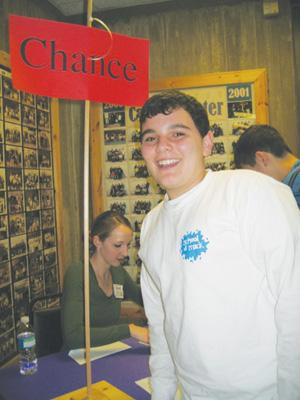 |
|
'Reality Store' Gives Students a Taste of Their Futureby KRISTEN ARMSTRONG, Staff Writer
|
|
| Insurance costs, mortgages,
car payments, child care. These “real world” concerns probably don't
plague most teenagers, but Arlington Career Center students recently got
a taste of adulthood responsibilities through the Reality Store, a
money-management-simulation activity geared toward high school students. Each of the approximately 900 students who participated was assigned an occupation related to the coursework he or she is taking at the Career Center. They were given a salary and family situation, and, using their remaining balance, after subtracting taxes and expenses such as student loans, participants had to make financial decisions while spending their money at eight different “stations.” Those stations, staffed by local volunteers, represented typical spending categories in a household budget, such as housing, transportation, groceries and medical expenses. Washington-Lee High School senior Monica Madera, who is studying animal science at the Career Center, was a veterinarian for the day, and said she learned just how challenging balancing a budget could be. “I make $6,649 a month, I'm married to a lawyer, I have student loans and I have a two-year-old daughter,” she said. “I'm pretty freaked out.” “The whole financial part of life is scary, but it really is common sense,” Madera said. “If you organize, it will work out.” Reality Store coordinators said they wished all participants had a similar response to the simulation. “I hope they learn how important it is to plan and prioritize, and see the importance of savings and insurance for emergencies,” said Jennifer Abel of Virginia Cooperative Extension, which sponsored the program. “We view [this activity] as part of workplace-readiness skills,” said the Career Center's student enterprise and partnerships coordinator, Suzanne Klett. “These are life skills they need to know now, whether they go to the workplace or college after they graduate.” To emphasize the role education plays in finances, students were assigned one of two occupations within their career field. One occupation required minimal education, such as a pet shop clerk or an auto porter, and the other occupation required college or advanced degrees, such as a veterinarian or master mechanic. “Hopefully, the ones who don't have a college degree see how much easier things are for the others who do have a degree, and see the value in going to college,” said Lisa Moore, a banking, finance and investment teacher at the Career Center. “I hope what the kids get out of it is the importance of education and its impact on earning power,” Abel said. Some students were surprised at how expensive things can be. “The two-bedroom apartment I'm renting is $2,010,” said commercial-art student Stephanie Gordon, whose occupation was graphic designer. “It's kind of depressing. I thought it would be cheaper.” Even though the Reality Store was a risk-free environment for students to explore budgeting, most seemed to take the activity seriously, and spent their money wisely. “I got a Toyota Corolla,” said student Alan Hurtado, who was assigned as an airman in the Air Force. “I wanted a Mustang, but that would have taken all my money!” Most of the students also thought the experience changed how they would approach their finances in the future. “I think [the Reality Store] will help me to make wise decisions,” Gordon said. “I'll just have to be careful.” |
 Nick Beirne tries his luck at the Reality Store’s “Chance” station, and pulled a card saying he had found $50. (Photo by Kristen Armstrong) |